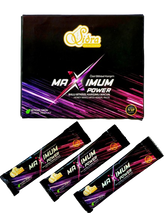Best Source of Vitamin C: Natural Foods & Supplements
Vitamin C, also known as ascorbic acid, is one of the most important nutrients for maintaining good health. It plays a key role in boosting immunity, repairing body tissues, producing collagen, and improving skin health. Since the body cannot produce Vitamin C naturally, it must be obtained from foods or supplements.
In this article, we’ll explore the best natural sources of Vitamin C, the role of supplements, benefits, recommended daily intake, and why it’s essential for overall wellness.
Why Vitamin C is Important

Vitamin C is a water-soluble vitamin that supports several functions in the body:
-
Strengthens the immune system
-
Helps in collagen production for skin, joints, and bones
-
Acts as a powerful antioxidant
-
Supports iron absorption from plant-based foods
-
Promotes wound healing
-
Improves skin texture and glow
Best Natural Sources of Vitamin C
Citrus Fruits
Citrus fruits are the most popular sources of Vitamin C. They are rich, easily available, and refreshing.
-
Oranges
-
Lemons
-
Grapefruits
-
Tangerines
Berries
Berries are packed with antioxidants and Vitamin C.
-
Strawberries
-
Blueberries
-
Raspberries
-
Blackberries
Tropical Fruits
Some tropical fruits contain a higher concentration of Vitamin C than citrus fruits.
-
Kiwi
-
Papaya
-
Pineapple
-
Guava (one guava provides more than 200% of the daily requirement)
Vegetables
Several vegetables are also excellent sources of Vitamin C.
-
Red and green bell peppers
-
Broccoli
-
Brussels sprouts
-
Spinach
-
Kale
Tomatoes
Fresh tomatoes and tomato juice are great Vitamin C sources. They also contain lycopene, which benefits heart health.
Vitamin C Supplements
While foods are the best natural sources, many people turn to Vitamin C supplements to meet their daily needs, especially if their diet lacks fresh fruits and vegetables.
Popular supplement forms:
-
Vitamin C tablets
-
Effervescent tablets
-
Chewable Vitamin C
-
Multivitamins with Vitamin C
Daily Requirement of Vitamin C
The recommended daily intake varies by age and gender:
-
Men: 90 mg/day
-
Women: 75 mg/day
-
Pregnant Women: 85 mg/day
-
Children: 15–65 mg/day (depending on age)
One medium orange or a cup of strawberries can almost cover the daily requirement.
Benefits of Consuming Vitamin C Foods and Supplements
-
Boosts Immunity – Helps fight infections and strengthens defense against colds and flu.
-
Improves Skin Health – Promotes collagen production, reducing wrinkles and giving glowing skin.
-
Supports Heart Health – Reduces oxidative stress and supports blood vessels.
-
Enhances Iron Absorption – Prevents iron deficiency anemia.
-
Speeds Up Recovery – Aids in wound healing and post-illness recovery.
Vitamin C Deficiency
A deficiency of Vitamin C can lead to:
-
Weak immunity
-
Dry and rough skin
-
Slow wound healing
-
Fatigue
-
Scurvy (in severe cases, causing gum bleeding and joint pain)
Conclusion
Vitamin C is an essential nutrient that supports immunity, skin, and overall health. The best sources of Vitamin C are fresh fruits like oranges, guavas, strawberries, and vegetables like bell peppers and broccoli. For people with poor dietary intake, supplements are also effective. Adding Vitamin C-rich foods to your diet daily is the key to staying healthy.


